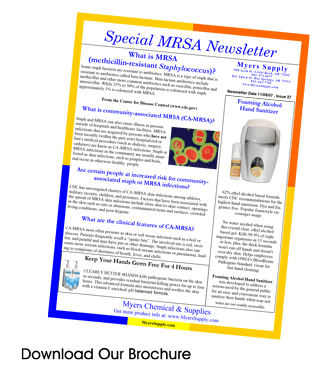
501.372.6677 Little Rock
501.623.7742 Hot Springs
 |
Infection Control: MRSA
 What is MRSA (methicillin-resistant Staphylococcus)?
What is MRSA (methicillin-resistant Staphylococcus)?
Some staph bacteria are resistant to antibiotics. MRSA is a type of staph that is resistant to antibiotics called beta-lactams. Beta-lactam antibiotics include methicillin and other more common antibiotics such as oxacillin, penicillin and amoxicillin.
While 25% to 30% of the population is colonized with staph, approximately 1% is colonized with MRSA. From the Center for Disease Control (www.cdc.gov)
Information on MRSA on Environmental Services in Healthcare Settings (from the Center for Disease Control (www.cdc.gov)
Guidelines for Environmental Infection Control in Health-Care Facilities
Careful cleaning of patient rooms and medical equipment contributes substantially to the overall control of MRSA transmission. The major focus of a control program for MRSA should be the prevention of hand transfer of these organisms. Routine cleaning and disinfection of the housekeeping surfaces (e.g., floors and walls) and patient-care surfaces (e.g., bedrails) should be adequate for inactivation of these organisms.
MRSA is susceptible to several EPA registered low- and intermediate-level disinfectants (e.g., alcohols, sodium hypochlorite, quaternary ammonium compounds, phenolics, and iodophors) at recommended use dilutions for environmental surface disinfection.
The use of stronger solutions of disinfectants for inactivation of MRSA is not recommended based on the organisms’ resistance to antibiotics.
> Download our Brochure on MRSA